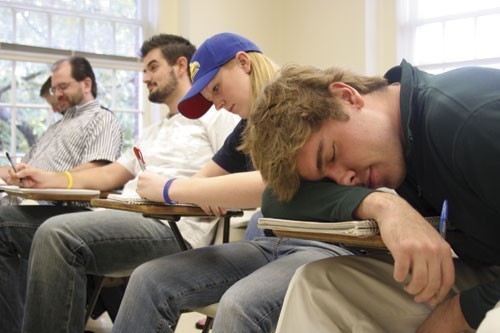
Students snooze or lose (Photo Illustration by Ben Briscoe, The Daily Campus)
A late night of studying for an exam and finishing an assignment with a double-shot espresso brings to mind the nights of little or no sleep that many college students face.
Students often give up sleep to study, socialize or attend activities.
“Sleep is competing with other priorities; it is underrated by social life or work,” Dr. Michael Shiekh, SMU Health Center psychiatrist, said. “Sleep loses out.”
Many SMU students face the dilemma – to sleep or not to sleep. Students are going into sleep debt because they have no time to rest. Other parts of their lives take up the needed time.
According to Dr. William Dement of Stanford University, sleep debt is the accumulated lost hours of sleep that your body needs. In a recent column, Dement said, “If you feel drowsy or fall asleep during the day, you have a sizeable sleep debt.” Other signs include difficulty waking up, difficulty concentrating and low motivation.
“I pull many all-nighters and nights when I go on very little sleep. Sleep is the first to go. It is probably the big thing that I give up,” sophomore Kate Murphy said.
Facing all of the exams and assignments due, students lose many hours of sleep to get their work done. “I procrastinate, then I have to cram and sleep is not an option,” Murphy said.
Not sleeping results in low performance in class and not being able to stay awake during lectures.
“Being sleep deprived affects your ability to concentrate and can cause accidents,” Shiekh said. “Whenever students fall asleep in class they can’t blame it on professors’ lectures being boring. It’s because students are not getting enough sleep.”
Murphy has experienced this problem. “When I don’t sleep, class seems much longer, because I am so tired,” she said. “Note taking is very hard to do when you are not alert.” She said she receives about five to six hours of sleep on average. “Mornings I do fine, once noon hits my main concern is getting to bed. I will skip class to get sleep, if it’s not important.”
According to the National Sleep Foundation’s 2005 “Sleep in America” poll, only half of adults said they get a good night’s sleep a few nights a week or more. One half of all respondents reported feeling tired, fatigued or not their best during wake time at least one day a week. Seventeen percent said this happens every day or almost every day.
The National Sleep Foundation also reported on average that humans need about eight hours of sleep for every 16 hours awake. Four in 10 U.S. adults spend less time sleeping than they did five years ago.
Students often feel fatigued, but many do not relate it to not getting enough sleep. The National Sleep Foundation said, “Sleep is not merely a ‘time out’ from our busy routines; it is essential for good health, mental and emotional functioning and safety.”
Some students notice other sleep deprived students. “I see that some students can’t stay awake [in class], you can see that they are not all there,” senior engineering major David Goodman said.
The recently published book “Creative Time Management for the New Millennium” says procrastination is not the No. 1 time waster; it is trying to do too much at once. Students overextend themselves. They have multiple demands for their time.
“In college, students are overloaded, there is a lot on their plates and a lot going on,” Shiekh said.
According to Shiekh, drugs such as alcohol and caffeine affect your sleep habits as much as not sleeping. These drugs can cause sleep disturbances throughout the night.
“Alcohol suppresses rapid-eye-movement sleep,” Shiekh said.
Dement reported REM makes up the fundamental sleep cycle necessary for our health and well-being. It plays a role in the regulation of mood, and its suppression may jeopardize learning and memory functions.
According to the SMU Health Center, many students think they have an attention deficit disorder and want treatment. However, they are only sleep deprived.
The National Institutes of Health said people can get used to a sleep-deprived schedule, but the human body has to have a certain amount of sleep to function properly.
“Get more sleep. Value sleep,” Shiekh said. “If you are feeling tired, and you are hitting the snooze button, try to get to bed early. Get extra sleep to feel refreshed and healthier.”








